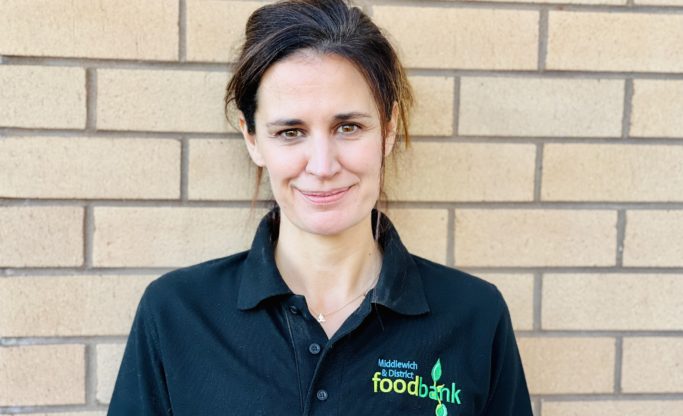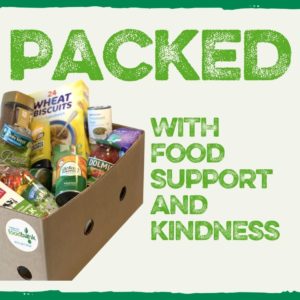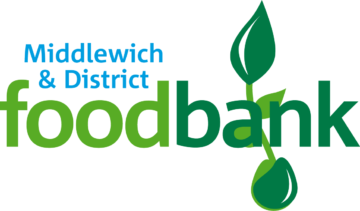
I started volunteering at Middlewich & District Foodbank in January 2021. I had never worked or used a food bank in the past and so was a little unsure what to expect. The time I have spent so far being part of the food bank has taught me a great deal and I wanted to share my experience in a bid to dispel some of the common misconceptions about how food banks operate.
During my first few shifts in January, we were still in what felt like the thick end of covid, after Christmas, fear was once again heightened and face masks and social distancing were more prevalent than ever, so I felt quite anxious about working inside a small warehouse. A brew and a biscuit at our 11am break on day one, soon put my worries at bay, a cup of tea really does sort the world out sometimes!
For the first few months, I got into a good routine and really liked the orderly nature of the job. I arrived at 9am and our day usually started with a ‘stock sorting’ job briefed in by Paul, the volunteer warehouse manager. Paul has the warehouse shipshape and it’s our job to keep it that way! Each day, deliveries would come in from other volunteers who had collected from the donation points from the supermarkets who support us. In Middlewich that’s Jacks, Lidl and Morrisons, from Holmes Chapel it’s Sainburys, Sandbach comes from Waitrose and Congleton is supported by Tesco. Each week, volunteers are on a rota to collect and empty the donation tubs and bring all the food to the warehouse for sorting. On my shifts, Ann and I would firstly weigh the food and make a note of the kilograms donated because all stock has to be accrued by Paul. All food is weighed in and out for accounting purposes, the value of food is reported in annual reports to the charity commission. We would then unpack the food and date it clearly, before sorting it into type. The date is important so that we can store it in date order, ensuring that all food is used and none of it wasted; we are unable to give away any out of date food. We then sort into type, so tinned vegetables all go together, tinned soup, pasta, biscuits, cereals etc. Everything is then stored away in date and type order.
No sooner than I got into my groove in the warehouse, I was asked to do a shift as a ‘picker’. This job is all about putting the food together for the individual, couple or family in need of a parcel. Each parcel contains a long list of essential items which The Trussell Trust recommend we should include. Obviously, our parcels are subject to the generous donations from the public and our supporter supermarkets, but we usually manage to exceed this list. The process of putting the parcel together was not what I expected before I understood how a foodbank worked. In my imagination (no doubt driven by American films I’d watched) people would arrive at the food bank to a hot meal and collect whatever food they needed, but this is not the case. The food parcel contains 3 days of emergency food, and are carefully put together, after a phone call with the client to determine any special requirements, such as dietary, hygiene, baby or pet. All over the country, food banks work slightly differently; our small food bank is only able to store non-perishable goods, however, we are very well supported by the community, so are able to cater to most needs.
Once the parcels are put together, they are either collected by the client if they are able to arrange transport, or they are delivered to their homes. My first experience of being a delivery driver for the food bank was in April. I made three deliveries to Crewe, Winsford and Middlewich. The parcels of food are in reusable supermarket bags, so no one would have any idea they are from a food bank, they are simply dropped off with a smile and a chat, if that person is comfortable with that.
On a couple of occasions this year, we have received large pallet donations from supermarkets, which I thought was brilliant, until I understood that the pallets contained products with an extremely short shelf life left. Huge amounts of orange squash all needed to be consumed within a week or biscuits with only a few days left before they became out of date. Before I understood the methodical nature of the food bank, I assumed ‘any food’ would be welcome and a good idea. Now I realise that actually certain items can become a bit of a headache, who needs a pallet of gherkins? Thankfully, we have an excellent network of other charities and organisations we work with so are able to put most of our donations to good use, at homeless shelters or across other food banks, but the onus and sometimes cost, is on us to do that. It is the responsibility of the foodbank to send out parcels of food which are nutritionally balanced and we have a list from The Trussell Trust to guide and advise us on the criteria, supermarkets are brilliant at sending us pallets of items which are essential, such as cereals, pasta, rice and tins of vegetables. A lot of supermarkets also allow us to advertise our current shortages with posters, and some go a step further and put pre-packed bags of food together for their customers to buy, which ensures we receive a great variation of food and cosmetic products.
Before working here, I did not appreciate that to access a food bank, you have to have a referral from a recognised organisation, such as your GP, school, social worker or a charity you are working with. In referring a client to a food bank, the organisation is making a tangible, positive first step towards helping someone get back on their feet. This referral enables people to access practical help, in terms of a food parcel, but also to build a relationship with their referral agency and begin to plan for their future with the support they need.
As well as the food bank, Middlewich & District also run a drop in cafe, which is called Number 28. It’s right in the centre of Middlewich, opposite the church. The idea of the cafe is that anyone can call in for a free refreshment, a chat, a friendly face and a listening ear. In the long term, the food bank would like to offer free financial support on a one to one basis at the cafe, they are currently seeking funding for this and I believe it will be an excellent and much needed service. In the meantime, the cafe offers a bit of respite for people who just need a friend to off load to, or just a laugh! Like I said, a brew and a chat can make all the difference sometimes. During one shift at the cafe, I even got to meet a tiny new 5 week old baby which made my day! The cafe is open on Tuesdays and Friday 12-2pm and I would encourage anyone to pop in and say hello.
Food has always been important to me. I love family meals and get togethers over food, I enjoy cooking and of course the joy of eating. To me, food represents good and happy times. The idea that this is not the same for everyone, that people in our own community are going hungry, worried they can’t stretch out their money to buy food is simply not right in the country we live in. The Trussell Trust believe that we should live in a world where there is no such thing as food banks, where they are unheard of and unnecessary, and I agree, but until we reach that day, I believe it is important that we come together as a community, to share food so that no one goes hungry. I also want people to feel unashamed to ask for help. If there is one thing this awful disease Covid has taught me, it is that we are only human, but boy, do we know how to love, protect and support each other and that we are all in it together.
It is difficult to describe the feeling I have working at the food bank, without including the word dignity. The staff, volunteers and trustees who run the food bank all show this in everything they do, you can feel the sense of pride in the work they do. They speak about their clients with a quiet respect that is so instinctive. There is no judgement here, we are all treated exactly the same. It is a refreshing and nourishing environment, it brings you back to basics, in the best possible way, it makes you feel part of something bigger than yourself, part of a community. This doesn’t mean I like food banks, they shouldn’t have to be here, but while they are, you couldn’t ask for a better one in your community than Middlewich & District Food Bank.

Written by Amy Townsend.



